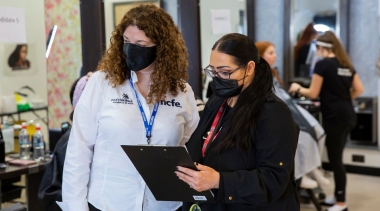“Thank you NCFE for supporting our event and to Dudley College of Technology for hosting us today.
I am delighted to be here to open our second International Skills Summit where we have a packed day around the theme of skills for growth.
And in these opening remarks I want to talk about how we are working with our partners to unleash the potential of a skills economy – and announce the creation of a new Skills Taskforce for Global Britain – to help power up our competitiveness and productivity by harnessing the world-class talent of the next generation.
So what do I mean by the skills economy?
In my mind it is a world in which governments, employers, parents and young people recognise being highly skilled as a valuable currency for success.
It’s about understanding the economic value of the skills people have – and how can they can be applied productively at work.
This is different to the knowledge economy – with the intellectual property generated in parts of our pharmaceutical, digital and engineering industries, supported by fantastic universities and research institutions, recognised as truly world-leading.
This has rightly been the jewel in the UK’s economic crown for the last few decades and something we should continue to champion.
Just look at how the knowledge economy has served us all well during the pandemic by creating vaccines quicker than anyone thought possible.
But equally, the pandemic has highlighted how we all rely on skilled workers to keep our society moving.
So, we shouldn’t put all our eggs in one basket.
We need two baskets – one in each hand – equally balanced – the knowledge economy and the skills economy.
Because the unintended consequence of the focus on the knowledge economy alone has been a down-playing and undervaluing of skills across society.
This has arguably led to a triple whammy of under-investment in further education, a lack of ambition for young people, from all backgrounds, who choose college or apprenticeships and a distraction from building the pipeline of high-quality technical skills that our employers and the economy need.
Just consider two examples of how our skills economy is underpowered.
Firstly, in England, we have what’s called a ‘missing middle’ – a lack of technicians, who hold higher technical qualifications, in sectors such as advanced manufacturing, automotive and life sciences, who fulfil roles such as lab technicians and production engineers and who are crucial for adopting and spreading innovation.
As leading skills advisor to No.10 Downing Street Professor Alison Wolf has highlighted: “Courses teaching technician…skills are vanishing from English education at speed, even though the economy is crying out for these skills.”
Secondly, an ambition to achieve excellence in training is being lost – meaning the quality of skills being developed aren’t always meeting the increasing standards required by employers to tackle their ongoing competitiveness challenges.
And our own data and experience competing internationally at WorldSkills all bears this out – gained from training young people to achieve world-class industry standards.
In countries such as Switzerland, Korea and Taiwan young people emerging from their skills system are better trained to achieve the standards of excellence required globally.
Whereas in the UK it can take two or more years of dedicated coaching and intense training to help our young people achieve the same level.
And we do – Team UK has been in the top ten globally over the past decade and two- thirds of our team achieve world-class standards.
But based on our recent WorldSkills international benchmark rankings, the UK is becoming less competitive in key sectors – such as engineering and advanced manufacturing.
Although we have been working hard to improve performance – we are in effect standing still and therefore falling behind because more countries – such as China, Korea, Japan, Russia and Singapore – have been investing more in the development of high-quality skills, making it much harder for UK to keep up.
So the stark message is this: we will continue to fall behind unless we place a much higher value on developing – maybe not just a skills economy – but a world-class skills economy.
And doing so will help tackle three worrying economic trends in the UK.
Firstly, productivity levels – which have been stubbornly low over the past decade.
Secondly, the huge disparity in economic growth across the UK between nations and regions and between cities and towns.
Thirdly, our declining share in global foreign direct investment.
Many of the countries which are attracting more inward investment, such as China and Singapore, are the very countries we know are prioritising high-quality skills as an economic necessity.
And because of all of this, we are underpowering key sectors of the economy which are internationally traded and need to attract foreign investment to fund their expansion, to create high quality jobs, and to boost local economic development.
Last year a new report called Manufacturing the Future Workforce summed up the challenge in a nutshell – when it said: “If the UK could combine its world-leading research base – with a manufacturing workforce equipped with the knowledge and skills needed to deploy and exploit new technologies, it would secure its position as a world leader in the effective commercialisation of the very best ideas.”
So all of this adds up to a compelling case for developing a world-class skills economy – that can stand tall globally alongside our knowledge economy.
And it presents a fantastic opportunity to set a new level of ambition for skills and the time is now – because we have the right conditions for success:
- We have UK governments prioritising skills and economic development – in Wales and Northern Ireland skills strategies are being aligned with key growth sectors; and the Scottish Funding Council’s emphasis on developing higher standards in tertiary education is being based on international best practice.
- And in England the Prime Minister’s commitment to reform of further education aligns with local skills improvement plans to meet employer needs, the development of higher technical qualifications and linking with new thinking from the Skills and Productivity Board
- We are in the process of creating a new global role for the UK, setting out investment opportunities to the rest of the world through the recent creation of both an Office for Investment and an Investment Council to help attract more international business into the UK
- We have in economic recovery plans, a focus on sectors to help boost our recovery through international trade – like engineering and advanced manufacturing, digital, clean tech, creative and life sciences are all key – and are precisely the sectors which need young people with world-class skills to be competitive. And this means that we must put a greater emphasis on – and pride in – developing home-grown young talent – rather than just relying on visas.
All of this creates the right environment right now to put the development of a world-class skills economy centre stage – and address concerns from inward investors and employers about skills supply and quality, as set out in surveys of inward investment trends by consultancy EY.
And the opportunity to set a new level of ambition for skills is exactly why we at WorldSkills UK have seized the moment and are radically reshaping what we do.
That is why I can announce today that WorldSkills UK has commissioned a new Skills Task Force for Global Britain, with consultancy firm EY as our Founding Member and with John Cridland, former Director General of the CBI, as Chair.
Our ambition is to highlight the crucial role of high-quality skills for employers in internationally traded sectors to attract inward investment to all parts of the UK – and help level up our economy.
Bolstering our ability to attract international investment will bring huge benefits in terms of jobs, technology and innovation – not just in big multi-national firms but in clusters of smaller firms and supply chains across the towns, cities, regions and nations.
Our new Task Force members have agreed to take on the challenge of developing a Roadmap to 2030, setting out key steps so that by the end of this decade the quality of our young people’s skills will be recognised globally as a key calling card for attracting inward investment to create high quality jobs and sustain economic growth.
And to support this focus on higher quality skills we are also seizing the opportunity to expand our plans to mainstream global best practice in training across the UK.
We currently work with 90% of colleges in towns and cities supporting the development of students and apprentices through this powerful local network.
And we have set ourselves the mission of using our over 60 years’ experience of training to world-class levels to help improve standards and boost opportunity for more young people and employers.
So our Centre of Excellence, in partnership with NCFE, and based on diagnostic research from the University of Oxford, is growing to spearhead the drive to boost standards in teaching so that more young people, from all backgrounds, are highly skilled, confident and ready for work.
Our Innovation Network is growing, with partners accessing data developed by WorldSkills UK to benchmark and improve their performance.
While our Skills Development Hub offers online access to training resources developed by our international experts.
We are now working with a quarter of all colleges in depth to help mainstream global best practice to drive up standards.
And we are growing all this work – to support more colleges, more training providers and more universities – helping more young people succeed – and to better meet the demand for world-class skills from key employers and international investors.
And I want to end by saying that at WorldSkills UK we are not just up for playing our role in supporting the recovery – but we are committed to creating a world-class skills economy for the long-term.
And not only to bring economic dividends – but also as a way of tackling head on misplaced snobbery about the value of technical education and apprenticeships.
And we are not alone in this.
My conversations across the WorldSkills global network reveals that many countries are grappling with how best to develop skills that will support recovery, and crucially give more young people, from all backgrounds, a sense of opportunity, ambition and aspiration – restoring pride in choosing a technical career route.
We know this change won’t happen overnight – there are no quick fixes.
It will required sustained effort to build momentum for the future.
Many of our partners at WorldSkills UK are already leading the way:
- innovating to mainstream global best practice to help young people meet ever-higher standards demanded by employers
- developing and supporting teachers to meet standards of excellence in training and assessment and
- inspiring more young people to follow apprenticeships and technical education – as routes to success
But we need to do more.
That’s why we will keep championing innovation, harnessing our global network and international best practice to support the further education system to boost standards in higher technical education for young people, employers and investors.
That’s why we will continue to explore the possibilities of hosting the WorldSkills festival – the skills olympics – on home soil again here in the UK in the next ten years – as a tangible catalyst for change, galvanising partners to create a long-lasting world-class skills legacy.
That’s why we want to expand our coalition to include more colleges and universities, more employers and more sectoral partners and trade unions.
We want more partners to join us in our national and international networks with the same ambition:
- leading the change over the next decade
- making a world-class skills economy a reality
- standing tall on the global stage – hand in hand with our world-leading knowledge economy
- building a prosperous future across the UK
- attracting more international investment into digital and green economies
- harnessing the skills and talent of the next generation…
…because when young people succeed – we all succeed.
Thank you.”





